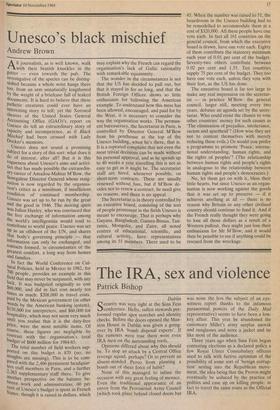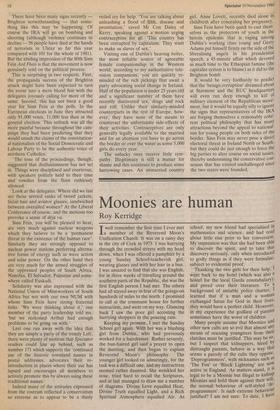The IRA, sex and violence
Patrick Bishop
Dublin Security was very tight at the Sinn Fein conference. Hefty, sullen stewards per- formed regular spot searches and identity checks. Before the doors opened the Man- sion House in Dublin was given a going- over by IRA 'bomb disposal experts'. If the rumours were true there were even IRA men on the surrounding roofs.
Opinions differed about why this should be. To stop an attack by a Central Office revenge squad, perhaps? Or to prevent an absent-minded Provo from planting a bomb out of sheer force of habit?
None of this managed to infuse the occasion with any great feeling of menace. Even the traditional appearance of an envoy from the Provisional Army Council (which took place behind closed doors but
was none the less the subject of an eye- witness report thanks to the infamous paranormal powers of the Daily Mail representative) seems to have been a low- key affair. This year he abandoned the customary Millet's army surplus anorak and sunglasses and wore a jacket and tie like most of the audience.
Three years ago when Sinn Fein began contesting elections as a declared policy a few Royal Ulster Constabulary officers used to talk with furtive optimism of the possibility of some sort of 'benign corrup- tion' setting into the Republican move- ment, the idea being that the Provos might eventually be seduced by the practice of politics and ease up on killing people: in fact to travel the same route as the Official IRA. There have been many signs recently — Brighton notwithstanding — that some- thing like this may be happening. Of course the IRA will go on bombing and shooting (although violence continues to decline —56 people have died at the hands of terrorists in Ulster so far this year compared with 101 for the whole of 1981). But the abiding impression of the 80th Sinn Fein Ard Fheis is that the movement is now genuinely sold on the political process.
This is surprising in two respects. First, the propaganda success of the Brighton attack might have been expected to turn the event into a mere blood fest with the delegates joyously calling for more of the same. Second, this has not been a good year for Sinn Fein at the polls. In the European elections in June they attracted only 91,000 votes, 11,000 less than in the general election. This setback was all the more painful because throughout the cam- paign they had been predicting that they would smash the claims of the constitution- al nationalists of the Social Democratic and Labour Party to be the authentic voice of northern Catholics.
The tone of the proceedings, though, suggested that disillusionment has not set in. Things were disciplined and courteous, with speakers politely held to their time and rowdies from the floor ruthlessly silenced.
Look at the delegates. Where did we last see those serried ranks of tweed jackets, facial hair and aviator glasses, sandwiched between overalled women? At the Liberal Conference of course, and the motions too provoke a sense of déjà vu.
Sinn Fein, you will be pleased to hear, are very much against nuclear weapons which they believe to be a 'permanent threat to the existence of the human race'. Similarly they are strongly opposed to nuclear power stations preferring alterna- tive forms of energy such as wave action and solar power. On the other hand they are very much for the armed struggles of the oppressed peoples of South Africa, Namibia, El Salvador, Palestine and some- where called Euskadi.
Solidarity was also expressed with the National Union of Mineworkers of South Africa but not with our own NUM with whom Sinn Fein have strong fraternal links. 'We were thinking about it,' one member of the party leadership told me, 'but we reckoned Arthur had enough problems to be going on with.'
Lest one run away with the idea that they are simply a party of the trendy Left, there were plenty of motions that Spectator readers could line up behind, such as number 171 which supports the 'continued use of the historic townland names in postal addresses, advocates their re- introduction in places where their use has lapsed and encourages all members to actively promote this by always using these traditional names.'
Indeed many of the attitudes expressed from the rostrum reflected a conservatism so extreme as to appear to be a thinly veiled cry for help. 'You are talking about unleashing a flood of filth, disease and prostitution,' raved Mr Con Daley of Kerry, speaking against a motion urging contraception for all. 'This country has been corrupted by capitalism. They want to make us slaves of sex.'
Visiting one of Dublin's heaving holies, the most reliable source of agreeable female companionship in the Western world, according to my authoritative tele- vision companions, you are quickly re- minded of the rich pickings that await a party advocating social change in Ireland. Half of the population is under 25 years old and a significant number of them have recently discovered sex, drugs and rock and roll. Unlike their similarly-minded counterparts in the rest of Europe, how- ever, they have none of the means to counteract the unfortunate side-effects of their activities. Contraceptives are only generally legally available to the married and for an abortion you have to go across the border or over the water as some 5,000 girls do every year.
The unlucky ones receive little sym- pathy. Illegitimacy is still a matter for shame and this continues to produce some harrowing cases. An unmarried country
girl, Anne Lovett, recently died alone in, childbirth after concealing her pregnancy.
Sinn Fein have been quick to cast them- selves as the protectors of youth in the heroin epidemic that is raging among Dublin's working class young and Gerry Adams put himself firmly on the side of the liberalising angels in his presidential speech, a 45-minute affair which devoted as much time to the Ethiopian famine (the capitalist system is to blame) as it did to the Brighton bomb. It would be very foolhardy to predict that the 'benign corruption' dreamed about at Stormont and the RUC headquarters will even run deep enough to kill of military element of the Republican move- ment, but it would be equally silly to ignore the signs that representatives of the IRA are forging themselves a reasonably cohe- rent political philosophy that has many attractions beyond the appeal to national- ism for young people on both sides of the border. Sinn Fein may never pose a direct electoral threat in Ireland North or South, but they could do just enough to force the big parties to alter course on social issues, thereby undermining the conservative con- sensus that has existed unchallenged since the two states were founded.















































 Previous page
Previous page